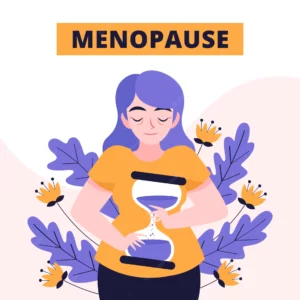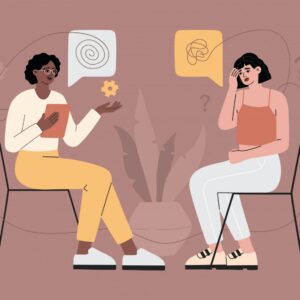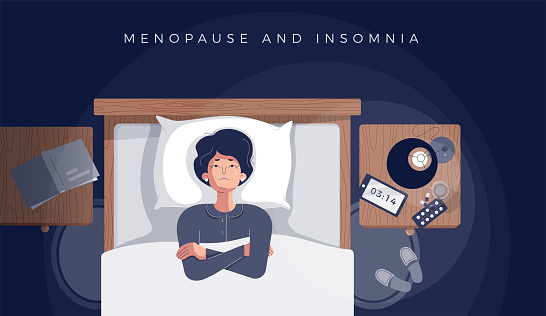Did you know that there is a strong connection between menopause and sleep? If you are experiencing menopause symptoms, it is likely that they are impacting your sleep quality as well. In this blog post, we will discuss the link between menopause and sleep, as well as some of the most common symptoms associated with each. We will also provide tips for how to get a good night’s sleep during menopause.
Contents
Defining Menopause
 Menopause is a phase in a woman’s life when her ovaries stop producing eggs and she can no longer become pregnant. Menopause typically occurs in women between the ages of 45 and 55, but it can occur sooner or later than this. The average age for menopause is 51 years old.
Menopause is a phase in a woman’s life when her ovaries stop producing eggs and she can no longer become pregnant. Menopause typically occurs in women between the ages of 45 and 55, but it can occur sooner or later than this. The average age for menopause is 51 years old.
There are a variety of symptoms associated with menopause, including hot flashes, night sweats, vaginal dryness, mood swings, and sleep problems. These symptoms can vary in severity from woman to woman. Some women experience only a few mild symptoms, while others find the symptoms to be more severe and disruptive to their daily lives.
Some common symptoms of menopause include:
- Hot flashes – Hot flashes are a sudden feeling of warmth, often followed by redness and sweating. They can occur at any time of day or night and can last for a few minutes to several hours.
- Night sweats – Night sweats are hot flashes that occur during the night. They can cause you to wake up feeling sweaty and clammy.
- Vaginal dryness – Vaginal dryness is a common symptom of menopause. This can cause discomfort during sex and make it more difficult to become aroused.
- Mood swings – Mood swings are sudden changes in mood that can range from mild irritability to severe anger or depression.
- Weight fluctuation – Weight gain or loss happens in menopause due to a variety of factors like changes in metabolism, diet, and activity level.
- Sleep problems – Sleep problems are common during menopause. Many women find it difficult to fall asleep or stay asleep through the night. Some women also experience night sweats, which can make sleeping even more difficult.
Different women may experience all or some of these signs with variation in intensities.
The Connection Between Sleep And Menopause
 As stated above, sleep problems are one of the most dominating symptoms of menopause. According to the National Sleep Foundation, 61% of menopausal and postmenopausal women report having difficulty sleeping. The most common sleep problems during menopause are insomnia and waking up frequently during the night.
As stated above, sleep problems are one of the most dominating symptoms of menopause. According to the National Sleep Foundation, 61% of menopausal and postmenopausal women report having difficulty sleeping. The most common sleep problems during menopause are insomnia and waking up frequently during the night.
There are a few different reasons why sleep problems are so common during menopause.
- One reason is due to the hormone fluctuations that occur during this time. Estrogen levels drop sharply during menopause, which can lead to hot flashes and night sweats. These symptoms can make it difficult to fall asleep and stay asleep through the night.
- Another reason for sleep problems during menopause is due to changes in lifestyle and stress levels. Many women find that they are juggling more responsibilities at home and work during this time of life. This can lead to increased levels of stress, which can make it difficult to relax and fall asleep at night.
- As menopause also manifests in physical changes like weight gain or loss and joint pain, these can also lead to sleep problems. Weight gain can cause discomfort and make it difficult to find a comfortable position to sleep in. Joint pain can make it difficult to fall asleep and cause you to wake up frequently during the night.
- Moreover, sleep problems can also exacerbate other menopausal symptoms like hot flashes, night sweats, and mood swings. This is because lack of sleep can lead to increased levels of stress, which can trigger hot flashes and make mood swings worse.
Effects On Life
Now that we know the relationship between menopause and sleep, it is essential to keep in mind the consequences it might have on a person’s life.
- The first and most important thing that sleep deprivation can cause is an overall decline in health. When a person is not getting enough sleep, the body does not have time to repair itself. This can lead to a weakened immune system, which can make you more susceptible to illness. Sleep deprivation can also cause high blood pressure, heart disease, and stroke.
- Another significant effect of sleep deprivation is decreased cognitive function. When you do not get enough sleep, your brain does not have time to process and store information properly. This can lead to problems with memory, concentration, and decision-making.
- Sleep deprivation can also cause mood swings and irritability. When you are tired, you are more likely to be short-tempered and impatient. This can lead to problems in your personal and professional life.
- On the contrary, menopause and thereby its lack of sleep may make one feel lethargic, unfocused, and disinterested. This can result in decreased productivity at work and may even lead to job loss.
- Lastly, too many disturbances can lead to sleep disorders, which are conditions that make it difficult to fall asleep or stay asleep. The most common sleep disorder is insomnia, which can be caused by menopause. Other sleep disorders include sleep apnea, which is a condition that causes you to stop breathing during sleep, and restless legs syndrome, which is a condition that causes an irresistible urge to move your legs during sleep.
All these consequences can have a significant impact on a person’s life, so it is important to be aware of the connection between menopause and sleep. If you are experiencing sleep problems, there are a lot of things you can do to help yourself.
Tips For Getting A Good Night’s Sleep During Menopause
Fortunately, there are a few things you can do to ease sleep problems during menopause. These can happen either through self-help methods or professional treatments.
Self-Help
 To start with the self-help methods, one way to ease hot flashes and night sweats is to sleep in a cool room. This will help you regulate your body temperature and make it easier to fall asleep. It is also important to wear loose-fitting, breathable clothing to bed so that you do not get too hot during the night.
To start with the self-help methods, one way to ease hot flashes and night sweats is to sleep in a cool room. This will help you regulate your body temperature and make it easier to fall asleep. It is also important to wear loose-fitting, breathable clothing to bed so that you do not get too hot during the night.
Another way to ease sleep problems is to establish a regular sleep schedule. This means going to bed and waking up at the same time every day, even on weekends. This will help your body get into a regular sleep rhythm and make it easier to fall asleep at night.
It is also important to create a relaxing bedtime routine. This can include taking a warm bath, reading a book, or listening to calm music. This will help your body and mind relax so that you can fall asleep more easily. You can also adapt to your environment by using noise-canceling headphones or a white noise machine to block out any disruptive sounds.
Lastly, it is important to avoid caffeine and alcohol before bed. Caffeine can keep you awake and make it difficult to fall asleep. Alcohol can make you feel drowsy, but it will actually disrupt your sleep later in the night. Another important thing to avoid during the day is taking naps. Napping can make it harder to fall asleep at night.
Professional Treatment
 If self-help doesn’t seem to suffice with your sleep problems, professional treatment may be necessary. One type of professional treatment is therapy. Therapy is the process of talking to a professional about your thoughts and feelings. This can help you identify any negative thought patterns that may be keeping you up at night. There are many types and approaches to therapy, so it is important to find a therapist that is right for you.
If self-help doesn’t seem to suffice with your sleep problems, professional treatment may be necessary. One type of professional treatment is therapy. Therapy is the process of talking to a professional about your thoughts and feelings. This can help you identify any negative thought patterns that may be keeping you up at night. There are many types and approaches to therapy, so it is important to find a therapist that is right for you.
Another type of professional treatment is medication. There are many different types of medications that can be used to treat sleep problems. These include antihistamines, antidepressants, and sedatives. It is important to talk to your doctor about which type of medication is right for your needs. They may also prescribe medicines for your menopause symptoms. These can include hormone replacement therapy and birth control pills.
Lastly, there are plenty of natural approaches to professional treatment for sleep. These include practices such as:
- acupuncture
- meditation
- mindfulness
- dietary alteration
- aromatherapy
- massage
These natural approaches can help you relax and ease any pain or discomfort that may be keeping you up at night.
Sleep is an important part of our lives, and it is especially important for those going through menopause. The sleep problems that come with menopause can have a significant impact on our lives. However, there are things we can do to ease these problems. With a little effort, we can get the sleep we need to feel our best.
Conclusion
Conclusively, we can state that menopause and sleep are interconnected. Many women experience sleep problems during menopause. There are many things that can cause sleep problems during menopause, but there are also many things you can do to ease these problems. With the right approach, you can get the sleep you need to feel your best. There are many self-help methods and professional treatments that can help. Experiment with what suits you and stick with it.
If you or someone you know is looking for psychological help, Therapy Mantra is here for you. We are the leading providers of online therapy and counseling. Our team of highly trained and experienced therapists can provide assistance at the most affordable rates. Contact us today to learn more about our services. You may also visit our website to book an online therapy session or download our free Android or iOS app for more information.


